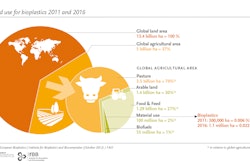The Association of Postconsumer Plastic Recyclers, the trade association of companies that recycle plastic, has reinforced its long-standing opposition to the use of degradable additives in currently and potentially recyclable bottles, containers, and films.
"Since mid-2009, APR has repeatedly asked those who sell and those who use oxo-degradable or biodegradable additives to consider the sustainability implications of those additives on the recyclability of packaging,” says Steve Alexander, APR’s director. “We have asked for the data that support the claims of bottles containing the additives would have no impact on the recyclability of a bottle, including next-use life. We have seen no credible supporting data. Without mitigating data, we must oppose the misuse of such additives in recyclable plastic.”
John Standish, APR’s technical director, explains, “The real concern is the impact of a degradable additive once the plastic is recycled and used in second and successive applications. A great deal of recycled plastic goes into carpeting, geo-textiles, strapping, plastic lumber, and pipe. All are long-lived uses. Some of these products have a 30 plus-year expected life span. What happens if the polymer molecules break down during the expected service life? Failure and potentially expensive remediation likely result.”
APR is reinforcing its support of legislation currently being considered in North Carolina and Alabama that would prohibit the use of the term “degradable and recyclable” on the label of a container and require containers with degradable additives to be labeled with the instruction “do not recycle.” APR recommends environmental certifying organizations always include the impact of degradable additives on plastics recycling before permitting the use of logos.
“Containers with these degradable additives can seriously impair the integrity of the plastic packaging recycling stream,” adds Alexander. “We have asked the additive providers to prove no harm done and have received no satisfactory answers. Hostile degradable additives not only mean the packaging containing them is unsuitable for recycling, but physically adjacent items are also rendered unfit. The impact goes beyond just the items containing the hostile additives.”
APR publishes extensive testing protocols for PET, polyethylene, and polypropylene items containing the degradable additives. The testing protocol includes the effects of the additives on the long-lived uses of recycled plastic.
APR consistently distinguishes between durable plastics that contain degradable additives and plastics that are inherently degradable or bio-sourced. Bio-sourced durable plastics, such as bio-PET and bio-polyethylene, can be recycled without difficulty with traditionally sourced resins. Other bio-sourced and inherently degradable plastics are resins such as PLA and should be recycled separately.

























